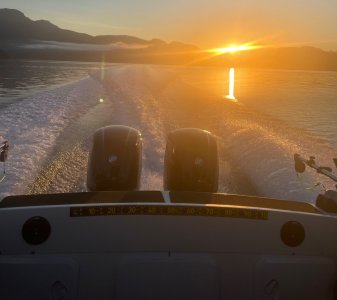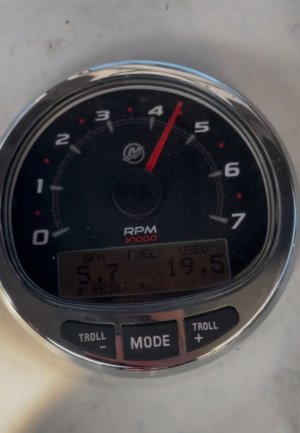You are using an out of date browser. It may not display this or other websites correctly.
You should upgrade or use an alternative browser.
You should upgrade or use an alternative browser.
Twins or Single Main
- Thread starter Laxputs
- Start date
M1SF1T
Well-Known Member
Those were factors for me. Twins are more maneuverable too. You can spin in place.
If you are running without a kicker, that factors in maintenance costs. 2 smaller vs. 1 bigger+another small is splitting hairs perhaps.
With troll control and low RPM on a large motor it's quieter than a 9.9 running high rpm for trolling.
If you are running without a kicker, that factors in maintenance costs. 2 smaller vs. 1 bigger+another small is splitting hairs perhaps.
With troll control and low RPM on a large motor it's quieter than a 9.9 running high rpm for trolling.
DanJ
Well-Known Member
I am happy having twins on my Double Eagle. 115’s are quiet and smooth.On a 22' welded aluminum (or any boat, really) is the main reason to choose twin 100's versus a single 200, redundancy, safety for getting home at planning speed? But you sacrifice fuel economy, and maintenance spend increases? Thanks.
Attachments
sudsy
Well-Known Member
Double the maintenance, more drag, fuel economy will be worse with 2 engines. Upfront cost is more for motors and rigging. Handling is better with twins, more comfort for offshore ventures. I debated it pretty hard when building my boat and opted for a single for how I'm using my boat.
DanJ
Well-Known Member
This was 4 days ago running to Bamfield. 5.7 gph so 114 gph for the two engines. This was with two people. Approx 200 lbs each and 300L of fuel as well as all the fishing gear and maintenance equipment like tools and spare fluids. This RPM was a speed of 32-34 mph motors are 2022 Mercury 115. 17 pitch prop
Attachments
kaelc
Crew Member
Weight and room on the transom are two big factors to consider. Twin 100’s will be hundreds of extra pounds in weight 360lbs each plus binnacle and cables vs 450 approximate for a 200hp. If you need to push a heavy boat 8000lb plus then twin 250 make more sense to me, but I'm not a naval architect.
Last edited:
M1SF1T
Well-Known Member
It's not double the maintenance because they're smaller outboards = less oil, fewer cylinders per engine and you aren't maintaining a kicker.
200 HP Merc is 480#, 15hp kicker is 135# for 615#. A pair of Merc 115 HPs is 720#. Unless you are sitting on the transom steering your kicker you have double rigging and associated cables and controls so that's pretty much a wash. I don't think 100# weight difference is going to have a major negative effect
Sure, you spend a little more on twins, but that's the price for all the advantages.
On my BV18EXT, two men, full fuel, gear, twin Merc Seapro 90s, ~4300 RPM, 5.1 GPH per side, ~30MPH. 25-27mph is better economy, but whatever.
200 HP Merc is 480#, 15hp kicker is 135# for 615#. A pair of Merc 115 HPs is 720#. Unless you are sitting on the transom steering your kicker you have double rigging and associated cables and controls so that's pretty much a wash. I don't think 100# weight difference is going to have a major negative effect
Sure, you spend a little more on twins, but that's the price for all the advantages.
On my BV18EXT, two men, full fuel, gear, twin Merc Seapro 90s, ~4300 RPM, 5.1 GPH per side, ~30MPH. 25-27mph is better economy, but whatever.
Rain City
Crew Member
Albeit much louder and with less control and power to get through rough conditions. I've run home on a kicker before, it sucks.The original post mentioned planing on one engine. That’s not a given. So if getting home is at hull speed a 9.9 is often the same as a 150. Just sayin..
kaelc
Crew Member
Original post was twins vs single, not single and a kicker. Lots of guys also go with twins and a kicker, as discussed in other threads including one member switching to lifePo4 batteries to save weight in the transom. Between larger displacement mains and kickers, downriggers, lead, larger batteries for modern electronics a lot of sterns have more weight than they were likely designed for in my opinion. I’m tempted to ditch my kicker and go with an electric trolling motor but added weight on the bow and all that is another discussion.
Love the power to weight ratio of many of the Merc engines, the Honda 200hp comes in at over 600lbs.
Maintenance intervals of trolling on a second motor vs all hours on one engine can cut the need for a mid season trip to the shop. The simplicity of doing maintenance on the exact same engine is a big plus in my books. Having ordered the wrong impeller for my kicker more than once.
Love the power to weight ratio of many of the Merc engines, the Honda 200hp comes in at over 600lbs.
Maintenance intervals of trolling on a second motor vs all hours on one engine can cut the need for a mid season trip to the shop. The simplicity of doing maintenance on the exact same engine is a big plus in my books. Having ordered the wrong impeller for my kicker more than once.
Many excellent replies & experiences already posted on here.
One consideration not yet fully fleshed out in the previous comments is: will you be going reasonably far offshore - or instead stay in sheltered waters?
If you plan on fishing/travelling lots in inclement weather - I would opt for the 2 engine combo verses the larger 1 + kicker. I don't know if you have tried pushing a boat long distances in inclement weather with a kicker - or not. But it's slow & awkward. Really only meant to get you around the corner into a safe anchorage - if there are any nearby. And this happens only after you get the wife, kids, dog, fish/beer coolers out of the corner where the kicker is that you haven't started in 3 years. And few people run up their kicker on regular basis and see how that is working - and if the kicker even starts (other than SamnJoe - kudos to you, bud!).
The nice thing with 2 engines - the other engine that has way more HP than a kicker - that can often still get you up on plane (or nearly so) - is already running if you hit a log or something that takes out the other engine - no waiting there. So you can easily & quickly get into a cove and replace the prop - if your prop got hit. Often in inclement weather timely response is a safety issue.
Also keep at least 1 extra prop onboard with a spare cotter pin. Everyone likes stainless props because of performance - but if they get hit - that shock may travel up your shaft into your lower leg. That usually means a bent shaft as minimum damage - maybe even damaged gears. Aluminum- on the other hand - is soft metal and it takes those shocks instead. Much easier (and cheaper) to replace an aluminum prop if you often travel in areas with lots of logs/deadheads.
One consideration not yet fully fleshed out in the previous comments is: will you be going reasonably far offshore - or instead stay in sheltered waters?
If you plan on fishing/travelling lots in inclement weather - I would opt for the 2 engine combo verses the larger 1 + kicker. I don't know if you have tried pushing a boat long distances in inclement weather with a kicker - or not. But it's slow & awkward. Really only meant to get you around the corner into a safe anchorage - if there are any nearby. And this happens only after you get the wife, kids, dog, fish/beer coolers out of the corner where the kicker is that you haven't started in 3 years. And few people run up their kicker on regular basis and see how that is working - and if the kicker even starts (other than SamnJoe - kudos to you, bud!).
The nice thing with 2 engines - the other engine that has way more HP than a kicker - that can often still get you up on plane (or nearly so) - is already running if you hit a log or something that takes out the other engine - no waiting there. So you can easily & quickly get into a cove and replace the prop - if your prop got hit. Often in inclement weather timely response is a safety issue.
Also keep at least 1 extra prop onboard with a spare cotter pin. Everyone likes stainless props because of performance - but if they get hit - that shock may travel up your shaft into your lower leg. That usually means a bent shaft as minimum damage - maybe even damaged gears. Aluminum- on the other hand - is soft metal and it takes those shocks instead. Much easier (and cheaper) to replace an aluminum prop if you often travel in areas with lots of logs/deadheads.
Last edited:
DanJ
Well-Known Member
I can plane on one engine at 25-27 mph. It takes a while to get up but once it is on plane its good.The original post mentioned planing on one engine. That’s not a given. So if getting home is at hull speed a 9.9 is often the same as a 150. Just sayin..
scott craven
Well-Known Member
Back in the days of big 2 stroke mains a kicker was necessary. Not so much anymore.Just did a repower this spring.
I dont like putting trolling hours on expensive mains.
Bigger 4 stroke engines don't mind trolling hours.
As long as maintained, these engines are happier kept running.
They are not nessisarily happy at an idle. No prop ring. The AP on my kicker is much more responsive than the AP on my mains.Back in the days of big 2 stroke mains a kicker was necessary. Not so much anymore.
Bigger 4 stroke engines don't mind trolling hours.
As long as maintained, these engines are happier kept running.
Also I don't like the high hours for resale.
Aquaholic
Crew Member
The hour read out from the computer components in modern four strokes help though. We know some of the lodge motors with incredibly high hours that still run very well and have good compression, but that’s also due to the fact that they’re running all the time, similar to a taxi cab. I have some friends in the taxi business for years ago, and they talk about the crazy mileage they’d get out of their cars, but some of them never cool down. They ran all the time other than mechanical service.They are not nessisarily happy at an idle. No prop ring. The AP on my kicker is much more responsive than the AP on my mains.
Also I don't like the high hours for resale.
Similar threads
- Replies
- 31
- Views
- 16K
- Replies
- 3
- Views
- 917
- Replies
- 2
- Views
- 2K
- Replies
- 49
- Views
- 7K


